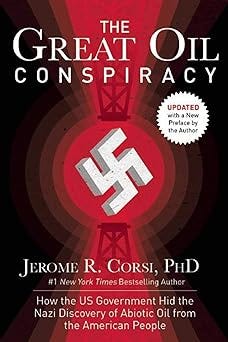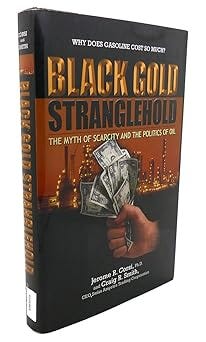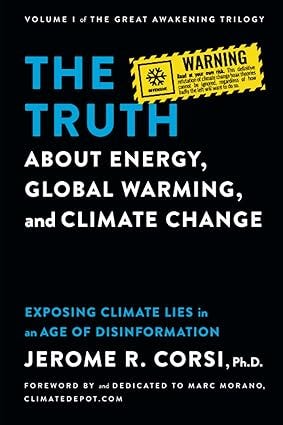Did the Rockefeller’s (or perhaps the petroleum industry) misrepresent petroleum oil as a "fossil fuel" with limited availability? Or is it a natural regenerative process that should be referred to as “abiotic oil”?
“it is incorrect to call petroleum oil a "fossil fuel" for the reasons stated in the Prouty video. Prouty's explanation, for example, refers to the hyperbolic use of the term fossil fuel to exaggerate petroleum oil's limited availability. The oil industry was always the originator of the rumors that the world is running out of oil, and they did so in order to manipulate supply and demand, and oil prices.”
.
or click here to watch on Rumble.
.
This Is What They Don’t Want You to Know About the Climate Agenda:
or click here to watch on Rumble.
.
Click here to visit Dr. Willie Soon’s website: www.ceres-science.com
.
.
The weather will be more gooder after you pay money to the government:
or click here to watch on Rumble.
.
Col. Fletcher Prouty explains invention and use of the term "Fossil Fuels":
or click here to watch on Rumble.
.
Books
“Clearly, big U.S. oil companies had no financial interest in explaining to the American people that oil was a natural product made on a continual basis deep within the earth. If there were only so many fossils in geological time, there could only be so much oil. Big oil could then charge more for a finite, rapidly disappearing resource than for a natural, renewable, and probably inexhaustible one.
Once oil is understood as an abundantly available resource, there is no reason hydro-carbon fuels cannot indefinitely propel the development and production of cheap energy reserves the United States needs to maintain its dominant position in the emerging global economy. The Great Oil Conspiracy, updated for this paperback release with a new chapter by Dr. Corsi, explains how German chemists had cracked the code to synthetic oil, and why the U.S. government is trying to keep their findings from you to this day.”
.
Black Gold Stranglehold: The Myth of Scarcity and the Politics of Oil:
“Experts estimate that Americans consume more than 25 percent of the world's oil but have control over less than 3 percent of its proven oil supply. This unbalanced pattern of consumption makes it possible for foreign governments, corrupt political leaders, terrorist organizations and oil conglomerates to hold the economy and the citizens of the United States in a virtual stranglehold. There is no greater proof of this than the direct relationship between skyrocketing gas prices and the explosion of wealth among those who control the world's supply of oil. In Black Gold Stranglehold, Jerome R. Corsi and Craig Smith expose the fraudulent science that has made America so vulnerable: the belief that oil is a fossil fuel and that it is a finite resource.”
.
“This book exposes the truth that the climate change hoax is a political movement aimed at eliminating capitalism by spreading alarming disinformation that in order to “save the Earth” from global warming, we must reduce carbon dioxide emissions by switching from hydrocarbon fuels to renewable energies.
The Truth about Energy, Global Warming, and Climate Change: Exposing Climate Lies in an Age of Disinformation reveals a science-based understanding of Earth’s climate and temperature that Green New Deal proponents are trying to hide. In the pages of this book, you will see scientifically documented evidence for many facts that the radical left denies.
Want to know the truth about how energy, temperature, and climate work? Read The Truth about Energy, Global Warming, and Climate Change—but prepare to be shocked. Jerome R. Corsi has conducted a tour-de-force examination of peer-reviewed climate science that exposes the neo-Marxists behind today’s anti-capitalist global warming hoax.”
.
“In Simon's view, the key factor in natural and world economic growth is our capacity for the creation of new ideas and contributions to knowledge. The more people alive who can be trained to help solve the problems that confront us, the faster we can remove obstacles, and the greater the economic inheritance we shall bequeath to our descendants. In conjunction with the size of the educated population, the key constraint on human progress is the nature of the economic-political system: talented people need economic freedom and security to bring their talents to fruition.”
.
.
Also see our related website pages:
.
.
"The truth is like a lion;
you don't have to defend it.
Let it loose;
it will defend itself."
~ Saint Augustine
(philosopher, theologian, and bishop)
The stages of action are:
denial >> awareness >> understanding >> solutions











Following the money, that just never runs out brings up a lot more questions on how UN is to be funded with what they say they want. Are they getting it through funded wars to push these agendas, where else could or would it come from. https://news.un.org/en/story/2023/09/1140997 Annual cost for reaching the SDG's More than 5 trillion. How do we know what is actually going on. Russia seems to be in pretty good shape. According to the UN Conference on Trade and Development (UNCTAD), this represents between $1,179 and $1,383 per person, per year.
The study factors in 50 SDG indicators across 90 countries, covering three quarters of the global population.
For the world’s 48 developing economies, the shortfall is estimated at $337 billion annually, if they are to take the required action on climate change, biodiversity loss and pollution.
When expanded to cover all developing economies, using the median per-capita cost for the 48 in the study, total annual needs rise to between $6.9 trillion and $7.6 trillion.
Although finding this kind of investment will likely be extremely difficult for countries with limited resources, the solution lies in allocating funding in cross-cutting areas, such as education, which also advances gender equality, poverty reduction and innovation – all Sustainable Development Goal (SDG) targets.
“Merely increasing funds won’t guarantee success. Governments, companies, investors and institutions need to strategically allocate their resources,” said Anu Peltola, who heads UNCTAD Statistics. “They don't have to stretch every dollar to cover every goal.”
The analysis focuses on six paths for transformation through sustainable development: social protection and decent jobs, transforming education, food systems, climate change, biodiversity loss and pollution, energy transition and inclusive digitization.